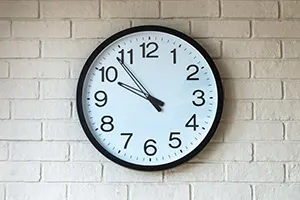Creating Positive Work Habits
Written By: Brittani Day

Many have heard the saying, variety is the spice of life. If that is the case, habit and consistency are seen as the structure of life. The interesting thing about a habit is that it is a routine behavior that tends to occur almost subconsciously. John Irving, the American novelist and screenwriter once said, “good habits are worth being fanatical about.” This falls right in line with a quote from Benjamin Franklin who once said, “It is easier to prevent bad habits than to break them.” Breaking habits can be one of the hardest things people have to deal with. It is important that we are aware of our habits almost to the point of being fanatical as they truly effect all aspects of our lives, including our relationships, our health, our attitude, and our work ethic. The implementation of better habits generates better quality of life and work.
We all recognize that good habits are the foundation for success, but they are also some of the hardest behaviors to implement. The following are a couple of healthy habits you could implement to improve your work life today.
One of the best habits to develop at work is creating small goals for each day and each week. Making a list will help you lay out what must be done first and foremost. On this list should be items that need to be done in order for any large goal to be accomplished. Getting in the habit of creating small goals more regularly will help make each day and week more approachable. You will be more motivated because the task at hand seems doable. Motivation is a critical part in developing habits. The Self-Determination Theory explains that intrinsic motivators (being motivated to do things internally, not through punishments or rewards) is critical in building positive habits.
Another important habit to develop that can lead to the implementation of new habits is punctuality. Not being on time can signal many different things including incompetence, self-centeredness, and even a lack of integrity. Being late shows that what you are showing up for isn’t very important to you. This is not the first impression you want to make at work with clients, coworkers, or managers. So, what are some steps to implementing punctuality? Schedule events in your calendar 10 minuets earlier than planned. If you have a lunch meeting at 1:00 p.m., schedule it for 12:50 a.m. Another tip would be to prepare for your scheduled event a few hours before. If you know you need to prepare for a meeting, take care f your to-do items well before the meeting starts. Procrastinating these things can lead to scrambling, being late, and not being fully prepared for important meetings.



Creating positive work habits might seem like more of personal preference or style, but there are strong business-related reasons for them. How you present yourself and conduct yourself at work has a big impact on your performance and on all of those with whom you interact. Your habits also have a large impact on your reputation at work. Gregory Ciotti, a writer for the 99u Adobe Journal said “If you want to be taken seriously in the workplace, your best bet is to learn and develop good work habits. People will perceive you as being more professional.”
Steve Jobs, the American inventor, designer and entrepreneur, who co-founded and served as the chief executive officer and chairman of Apple, was famously known for wearing the same thing to work every day. His signature look included a black turtleneck, jeans and New Balance sneakers. His habit of dressing in the same thing every day has been studied and explained as a way to avoid decision fatigue. Instead of getting up in the morning and thinking about what he would wear to work, he would get up and without thought, put on his turtleneck, jeans, and sneakers. Decision fatigue refers to the idea that your willpower or ability to make good decisions comes from a limited amount of mental resources. In an article in The New York Times written by John Tierney, it says “No matter how rational and high-minded you try to be, you can’t make decision after decision without paying a biological price. It’s different from ordinary physical fatigue — you’re not consciously aware of being tired — but you’re low on mental energy. The more choices you make throughout the day, the harder each one becomes for your brain, and eventually it looks for shortcuts.”
“We are what we repeatedly do. Excellence then, is not an act, but a habit.”Decision fatigue is one reason creating positive habits become essential. Now I am not suggesting that we should all wear the same thing to work every day or routinely eat the same thing for lunch. But perhaps you could get in the habit of taking the same route to work every day, or always going to the gym at the same time each day. Make a habit of coming into work and taking care of all of your unread emails first thing. Save your thoughts for more important things instead of “when will I get to go through my unread messages?”
Aristotle is known for his quote “We are what we repeatedly do. Excellence then, is not an act, but a habit.” Being aware of our habits at work, both positive and negative, is important to the success of our careers. For more information regarding creating positive habits or decision fatigue visit the following articles.
Sources:
www.developgoodhabits.com/good-workplace-habits
www.npr.org/2012/03/05/147192599/habits-how-they-form-and-how-to-break-them
www.npr.org/documents/2016/jul/Workplace-Health-Poll.pdf
www.nytimes.com/2011/08/21/magazine/do-you-suffer-from-decision-fatigue.html
Prev Article Next Article
